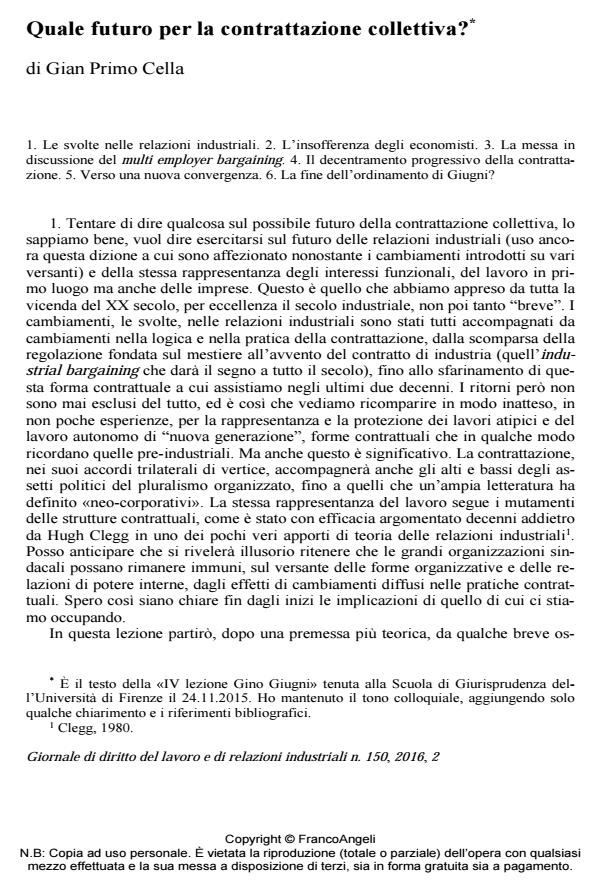Quale futuro per la contrattazione collettiva?
Journal title GIORNALE DI DIRITTO DEL LAVORO E DI RELAZIONI INDUSTRIALI
Author/s Gian Primo Cella
Publishing Year 2016 Issue 2016/150 Language Italian
Pages 14 P. 217-230 File size 181 KB
DOI 10.3280/GDL2016-150001
DOI is like a bar code for intellectual property: to have more infomation
click here
Below, you can see the article first page
If you want to buy this article in PDF format, you can do it, following the instructions to buy download credits

FrancoAngeli is member of Publishers International Linking Association, Inc (PILA), a not-for-profit association which run the CrossRef service enabling links to and from online scholarly content.
The future of collective bargaining and industrial relations is the theme of this «Gino Giugni Lesson». This future is very uncertain, as a consequence the destiny of labour law and industrial relations as fields of study is uncertain. Collective bargaining difficulties are pointed out by several indicators: the decline of the bargaining coverage, the strong decentralization, the disappearance of traditional European bargaining levels (as the interconfederal one), the weakening of collective actors, the spread of nonstandard work. Economists are trying to explain the reasons of this decline, but they do not consider the costs of the externalities caused by the same decline. The European scenario is characterized by relevant changes: decline of multi employer bargaining, UE and national governments support to bargaining decentralization and opening clauses. Taking into account general features it is possible to speak about a new convergence of the different European model experiences. Pluralist industrial relations are withering away. Is the European social model really losing its soul? The end of the lesson is dedicated to the Giugni’s theoretical contribution and to his extraordinary experience as a main protagonist of the Italian industrial relations in the second half of XXth century.
Keywords: Collective bargaining; Decline of multi employer bargaining; European model; Bargaining decentralization; Global markets; New convergence
- Barbera M., Perulli A., a cura di (2014). Consenso, dissenso e rappresentanza: le nuove relazioni sindacali. Padova: Cedam.
- Baccaro L., Howell C. (2010). Il cambiamento delle relazioni industriali nel capitalismo avanzato: una traiettoria comune. QRS, XIII, 1, p. 13 ss.
- Blanchard O., Giavazzi F. (2003). Macroeconomic Effects of Regulation and Deregulation in Goods and Labor Markets. QJE, p. 879 ss.
- Bordogna L., Pedersini R. (2015). What Kind of Europeanization? How Emu is Changing National Industrial Relations in Europe. DLRI, p. 183 ss.
- Borzaga M. (2015). Il decentramento “controllato” della contrattazione collettiva nella Repubblica federale tedesca come antidoto alla crisi economica: realtà o mito? DLRI, p. 275 ss.
- Cella G.P. (2007). Il cammino del pluralismo: Giugni e le relazioni industriali. DLRI, p. 273 ss.
- Clegg H.A. (1980). Sindacato e contrattazione collettiva. Milano: Franco Angeli.
- Crouch C. (2014). Introduction: labour markets and social policy after the crisis. Tr, p. 7 ss.
- Darcillon T. (2015). How does finance affect labor market institutions? An empirical analysis in 16 OECD countries. SER, p. 477 ss.
- Davies P., Freedland M., eds. (1983). Kahn-Freund’s Labour and the Law. London: Stevens & Sons.
- Edin P.A., Holmlund B. (1995). The Swedish Wage Structure. The Rise and Fall of Solidarity Wage Policy. In: Freeman R.B., Katz L.F., eds., Differences and Changes in Wage Structures. Chicago: University of Chicago Press, p. 307 ss.
- Giugni G. (1989). Lavoro leggi contratti. Bologna: il Mulino.
- Giugni G. (1991). La riforma delle relazioni industriali. L&I, gennaio.
- Giugni G. (2003). La lunga marcia della concertazione, a cura di Ferrari P. e La Macchia C. Bologna: il Mulino.
- Grossi P. (2007). Gino Giugni nella scienza giuridica italiana del Novecento. DLRI, p. 247 ss.
- Hall P., Soskice D., eds. (2001). Varieties of Capitalism. Oxford: Oxford University Press.
- Hirsch B.T. (2008). Sluggish Institutions in a Dynamic World: Can Unions and Industrial Competition Coexist?. JEP, p. 153 ss.
- Kochan T.A. (2012). Collective bargaining: crisis and its consequences for American Society. IRJ, p. 302 ss.
- Marginson P., Keune M., Bohle D. (2014). Negotiating the effects of uncertainty? The governance capacity of collective bargaining under pressure. Tr, p. 37 ss.
- Marginson P. (2015). Coordinated bargaining in Europe: From incremental corrosion to frontal assault?. EJIR, p. 97 ss.
- Pizzoferrato A. (2015). L’autonomia collettiva nel nuovo diritto del lavoro. DLRI, p. 411 ss.
- Prosser T. (2014). Financialization and the reform of European industrial relations systems. EJIR, p. 335 ss.
- Sciarra S. (2015). Il diritto sociale europeo al tempo della crisi. DUE, p. 757 ss.
- Streeck W. (2009). Re-Forming Capitalism. Oxford: Oxford University Press.
- Taipa M., Ibsen C.L., Kochan T.A. (2015). Mapping the frontier of theory in industrial relations: the contested role of worker representation. SER, p. 157 ss.
- Treu T. (2015). Il riordino dei tipi contrattuali nel Jobs Act. DLRI, p. 155 ss.
- Vaughan-Whitehead D. (2015). Is Europe Losing Its Soul? The European Social Model in Times of Crisis. In: Id., ed., The European Social Model in Crisis: Is Europe Losing Its Soul?. Geneva: ILO (Elgar).
- Visser J. (2013). The ICTWSS Database. Amsterdam: Aias, University of Amsterdam
- On some issues of international legal and national regulation of working hours in pandemic conditions COVID-19 T. A. Izbienova, in Voprosy trudovogo prava (Labor law issues) /2020 pp.34
DOI: 10.33920/pol-2-2010-05 - Gino Giugni: appunti per la storia di un progetto di modernizzazione mancato Francesco Liso, in GIORNALE DI DIRITTO DEL LAVORO E DI RELAZIONI INDUSTRIALI 157/2018 pp.1
DOI: 10.3280/GDL2018-157001 - The future of collective bargaining in Italy between legislative reforms and social partners’ responses Giuseppe Antonio Recchia, in Transfer: European Review of Labour and Research /2017 pp.457
DOI: 10.1177/1024258917729320
Gian Primo Cella, Quale futuro per la contrattazione collettiva? in "GIORNALE DI DIRITTO DEL LAVORO E DI RELAZIONI INDUSTRIALI " 150/2016, pp 217-230, DOI: 10.3280/GDL2016-150001